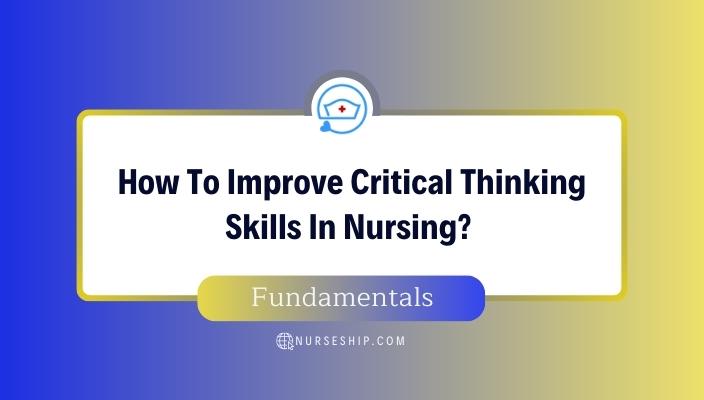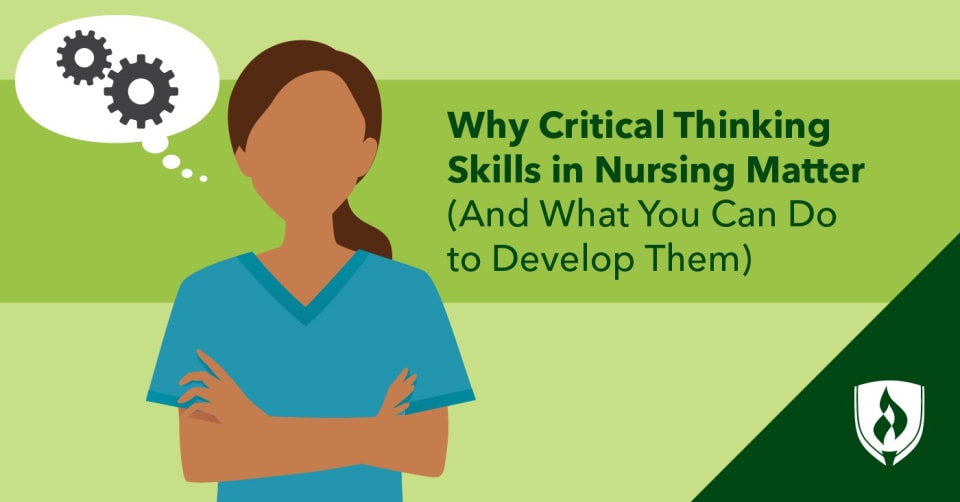What is Critical Thinking in Nursing? (With Examples, Importance, & How to Improve)

Successful nursing requires learning several skills used to communicate with patients, families, and healthcare teams. One of the most essential skills nurses must develop is the ability to demonstrate critical thinking. If you are a nurse, perhaps you have asked if there is a way to know how to improve critical thinking in nursing? As you read this article, you will learn what critical thinking in nursing is and why it is important. You will also find 18 simple tips to improve critical thinking in nursing and sample scenarios about how to apply critical thinking in your nursing career.

What Is Critical Thinking In Nursing?
4 reasons why critical thinking is so important in nursing, 1. critical thinking skills will help you anticipate and understand changes in your patient’s condition., 2. with strong critical thinking skills, you can make decisions about patient care that is most favorable for the patient and intended outcomes., 3. strong critical thinking skills in nursing can contribute to innovative improvements and professional development., 4. critical thinking skills in nursing contribute to rational decision-making, which improves patient outcomes., what are the 8 important attributes of excellent critical thinking in nursing, 1. the ability to interpret information:, 2. independent thought:, 3. impartiality:, 4. intuition:, 5. problem solving:, 6. flexibility:, 7. perseverance:, 8. integrity:, examples of poor critical thinking vs excellent critical thinking in nursing, 1. scenario: patient/caregiver interactions, poor critical thinking:, excellent critical thinking:, 2. scenario: improving patient care quality, 3. scenario: interdisciplinary collaboration, 4. scenario: precepting nursing students and other nurses, how to improve critical thinking in nursing, 1. demonstrate open-mindedness., 2. practice self-awareness., 3. avoid judgment., 4. eliminate personal biases., 5. do not be afraid to ask questions., 6. find an experienced mentor., 7. join professional nursing organizations., 8. establish a routine of self-reflection., 9. utilize the chain of command., 10. determine the significance of data and decide if it is sufficient for decision-making., 11. volunteer for leadership positions or opportunities., 12. use previous facts and experiences to help develop stronger critical thinking skills in nursing., 13. establish priorities., 14. trust your knowledge and be confident in your abilities., 15. be curious about everything., 16. practice fair-mindedness., 17. learn the value of intellectual humility., 18. never stop learning., 4 consequences of poor critical thinking in nursing, 1. the most significant risk associated with poor critical thinking in nursing is inadequate patient care., 2. failure to recognize changes in patient status:, 3. lack of effective critical thinking in nursing can impact the cost of healthcare., 4. lack of critical thinking skills in nursing can cause a breakdown in communication within the interdisciplinary team., useful resources to improve critical thinking in nursing, youtube videos, my final thoughts, frequently asked questions answered by our expert, 1. will lack of critical thinking impact my nursing career, 2. usually, how long does it take for a nurse to improve their critical thinking skills, 3. do all types of nurses require excellent critical thinking skills, 4. how can i assess my critical thinking skills in nursing.
• Ask relevant questions • Justify opinions • Address and evaluate multiple points of view • Explain assumptions and reasons related to your choice of patient care options
5. Can I Be a Nurse If I Cannot Think Critically?

The Value of Critical Thinking in Nursing

- How Nurses Use Critical Thinking
- How to Improve Critical Thinking
- Common Mistakes

Some experts describe a person’s ability to question belief systems, test previously held assumptions, and recognize ambiguity as evidence of critical thinking. Others identify specific skills that demonstrate critical thinking, such as the ability to identify problems and biases, infer and draw conclusions, and determine the relevance of information to a situation.
Nicholas McGowan, BSN, RN, CCRN, has been a critical care nurse for 10 years in neurological trauma nursing and cardiovascular and surgical intensive care. He defines critical thinking as “necessary for problem-solving and decision-making by healthcare providers. It is a process where people use a logical process to gather information and take purposeful action based on their evaluation.”
“This cognitive process is vital for excellent patient outcomes because it requires that nurses make clinical decisions utilizing a variety of different lenses, such as fairness, ethics, and evidence-based practice,” he says.
How Do Nurses Use Critical Thinking?
Successful nurses think beyond their assigned tasks to deliver excellent care for their patients. For example, a nurse might be tasked with changing a wound dressing, delivering medications, and monitoring vital signs during a shift. However, it requires critical thinking skills to understand how a difference in the wound may affect blood pressure and temperature and when those changes may require immediate medical intervention.
Nurses care for many patients during their shifts. Strong critical thinking skills are crucial when juggling various tasks so patient safety and care are not compromised.
Jenna Liphart Rhoads, Ph.D., RN, is a nurse educator with a clinical background in surgical-trauma adult critical care, where critical thinking and action were essential to the safety of her patients. She talks about examples of critical thinking in a healthcare environment, saying:
“Nurses must also critically think to determine which patient to see first, which medications to pass first, and the order in which to organize their day caring for patients. Patient conditions and environments are continually in flux, therefore nurses must constantly be evaluating and re-evaluating information they gather (assess) to keep their patients safe.”
The COVID-19 pandemic created hospital care situations where critical thinking was essential. It was expected of the nurses on the general floor and in intensive care units. Crystal Slaughter is an advanced practice nurse in the intensive care unit (ICU) and a nurse educator. She observed critical thinking throughout the pandemic as she watched intensive care nurses test the boundaries of previously held beliefs and master providing excellent care while preserving resources.
“Nurses are at the patient’s bedside and are often the first ones to detect issues. Then, the nurse needs to gather the appropriate subjective and objective data from the patient in order to frame a concise problem statement or question for the physician or advanced practice provider,” she explains.
Top 5 Ways Nurses Can Improve Critical Thinking Skills
We asked our experts for the top five strategies nurses can use to purposefully improve their critical thinking skills.
Case-Based Approach
Slaughter is a fan of the case-based approach to learning critical thinking skills.
In much the same way a detective would approach a mystery, she mentors her students to ask questions about the situation that help determine the information they have and the information they need. “What is going on? What information am I missing? Can I get that information? What does that information mean for the patient? How quickly do I need to act?”
Consider forming a group and working with a mentor who can guide you through case studies. This provides you with a learner-centered environment in which you can analyze data to reach conclusions and develop communication, analytical, and collaborative skills with your colleagues.
Practice Self-Reflection
Rhoads is an advocate for self-reflection. “Nurses should reflect upon what went well or did not go well in their workday and identify areas of improvement or situations in which they should have reached out for help.” Self-reflection is a form of personal analysis to observe and evaluate situations and how you responded.
This gives you the opportunity to discover mistakes you may have made and to establish new behavior patterns that may help you make better decisions. You likely already do this. For example, after a disagreement or contentious meeting, you may go over the conversation in your head and think about ways you could have responded.
It’s important to go through the decisions you made during your day and determine if you should have gotten more information before acting or if you could have asked better questions.
During self-reflection, you may try thinking about the problem in reverse. This may not give you an immediate answer, but can help you see the situation with fresh eyes and a new perspective. How would the outcome of the day be different if you planned the dressing change in reverse with the assumption you would find a wound infection? How does this information change your plan for the next dressing change?
Develop a Questioning Mind
McGowan has learned that “critical thinking is a self-driven process. It isn’t something that can simply be taught. Rather, it is something that you practice and cultivate with experience. To develop critical thinking skills, you have to be curious and inquisitive.”
To gain critical thinking skills, you must undergo a purposeful process of learning strategies and using them consistently so they become a habit. One of those strategies is developing a questioning mind. Meaningful questions lead to useful answers and are at the core of critical thinking .
However, learning to ask insightful questions is a skill you must develop. Faced with staff and nursing shortages , declining patient conditions, and a rising number of tasks to be completed, it may be difficult to do more than finish the task in front of you. Yet, questions drive active learning and train your brain to see the world differently and take nothing for granted.
It is easier to practice questioning in a non-stressful, quiet environment until it becomes a habit. Then, in the moment when your patient’s care depends on your ability to ask the right questions, you can be ready to rise to the occasion.
Practice Self-Awareness in the Moment
Critical thinking in nursing requires self-awareness and being present in the moment. During a hectic shift, it is easy to lose focus as you struggle to finish every task needed for your patients. Passing medication, changing dressings, and hanging intravenous lines all while trying to assess your patient’s mental and emotional status can affect your focus and how you manage stress as a nurse .
Staying present helps you to be proactive in your thinking and anticipate what might happen, such as bringing extra lubricant for a catheterization or extra gloves for a dressing change.
By staying present, you are also better able to practice active listening. This raises your assessment skills and gives you more information as a basis for your interventions and decisions.
Use a Process
As you are developing critical thinking skills, it can be helpful to use a process. For example:
- Ask questions.
- Gather information.
- Implement a strategy.
- Evaluate the results.
- Consider another point of view.
These are the fundamental steps of the nursing process (assess, diagnose, plan, implement, evaluate). The last step will help you overcome one of the common problems of critical thinking in nursing — personal bias.
Common Critical Thinking Pitfalls in Nursing
Your brain uses a set of processes to make inferences about what’s happening around you. In some cases, your unreliable biases can lead you down the wrong path. McGowan places personal biases at the top of his list of common pitfalls to critical thinking in nursing.
“We all form biases based on our own experiences. However, nurses have to learn to separate their own biases from each patient encounter to avoid making false assumptions that may interfere with their care,” he says. Successful critical thinkers accept they have personal biases and learn to look out for them. Awareness of your biases is the first step to understanding if your personal bias is contributing to the wrong decision.
New nurses may be overwhelmed by the transition from academics to clinical practice, leading to a task-oriented mindset and a common new nurse mistake ; this conflicts with critical thinking skills.
“Consider a patient whose blood pressure is low but who also needs to take a blood pressure medication at a scheduled time. A task-oriented nurse may provide the medication without regard for the patient’s blood pressure because medication administration is a task that must be completed,” Slaughter says. “A nurse employing critical thinking skills would address the low blood pressure, review the patient’s blood pressure history and trends, and potentially call the physician to discuss whether medication should be withheld.”
Fear and pride may also stand in the way of developing critical thinking skills. Your belief system and worldview provide comfort and guidance, but this can impede your judgment when you are faced with an individual whose belief system or cultural practices are not the same as yours. Fear or pride may prevent you from pursuing a line of questioning that would benefit the patient. Nurses with strong critical thinking skills exhibit:
- Learn from their mistakes and the mistakes of other nurses
- Look forward to integrating changes that improve patient care
- Treat each patient interaction as a part of a whole
- Evaluate new events based on past knowledge and adjust decision-making as needed
- Solve problems with their colleagues
- Are self-confident
- Acknowledge biases and seek to ensure these do not impact patient care
An Essential Skill for All Nurses
Critical thinking in nursing protects patient health and contributes to professional development and career advancement. Administrative and clinical nursing leaders are required to have strong critical thinking skills to be successful in their positions.
By using the strategies in this guide during your daily life and in your nursing role, you can intentionally improve your critical thinking abilities and be rewarded with better patient outcomes and potential career advancement.
Frequently Asked Questions About Critical Thinking in Nursing
How are critical thinking skills utilized in nursing practice.
Nursing practice utilizes critical thinking skills to provide the best care for patients. Often, the patient’s cause of pain or health issue is not immediately clear. Nursing professionals need to use their knowledge to determine what might be causing distress, collect vital information, and make quick decisions on how best to handle the situation.
How does nursing school develop critical thinking skills?
Nursing school gives students the knowledge professional nurses use to make important healthcare decisions for their patients. Students learn about diseases, anatomy, and physiology, and how to improve the patient’s overall well-being. Learners also participate in supervised clinical experiences, where they practice using their critical thinking skills to make decisions in professional settings.
Do only nurse managers use critical thinking?
Nurse managers certainly use critical thinking skills in their daily duties. But when working in a health setting, anyone giving care to patients uses their critical thinking skills. Everyone — including licensed practical nurses, registered nurses, and advanced nurse practitioners —needs to flex their critical thinking skills to make potentially life-saving decisions.
Meet Our Contributors

Crystal Slaughter, DNP, APRN, ACNS-BC, CNE
Crystal Slaughter is a core faculty member in Walden University’s RN-to-BSN program. She has worked as an advanced practice registered nurse with an intensivist/pulmonary service to provide care to hospitalized ICU patients and in inpatient palliative care. Slaughter’s clinical interests lie in nursing education and evidence-based practice initiatives to promote improving patient care.

Jenna Liphart Rhoads, Ph.D., RN
Jenna Liphart Rhoads is a nurse educator and freelance author and editor. She earned a BSN from Saint Francis Medical Center College of Nursing and an MS in nursing education from Northern Illinois University. Rhoads earned a Ph.D. in education with a concentration in nursing education from Capella University where she researched the moderation effects of emotional intelligence on the relationship of stress and GPA in military veteran nursing students. Her clinical background includes surgical-trauma adult critical care, interventional radiology procedures, and conscious sedation in adult and pediatric populations.

Nicholas McGowan, BSN, RN, CCRN
Nicholas McGowan is a critical care nurse with 10 years of experience in cardiovascular, surgical intensive care, and neurological trauma nursing. McGowan also has a background in education, leadership, and public speaking. He is an online learner who builds on his foundation of critical care nursing, which he uses directly at the bedside where he still practices. In addition, McGowan hosts an online course at Critical Care Academy where he helps nurses achieve critical care (CCRN) certification.

How To Improve Critical Thinking Skills In Nursing? 24 Strategies With Examples

Last updated on August 19th, 2023
Nurses play a critical role in making critical decisions that directly impact patient outcomes in the dynamic field of healthcare. Developing strong critical thinking skills is essential for success in this role.
In this article, we present a comprehensive list of 23 nursing-specific strategies aimed at improving critical thinking and improve the quality of patient care.
24 Strategies to improve critical thinking skills in nursing
You may also want to check out: 15 Attitudes of Critical Thinking in Nursing (Explained W/ Examples)
1. Reflective Journaling: Delving into Deeper Understanding
Reflective journaling is a potent tool for nurses to explore their experiences, actions, and decisions.
By regularly pondering over situations and analyzing their thought processes, nurses can identify strengths and areas for improvement.
This practice encourages the conscious development of critical thinking by comparing past experiences with current knowledge and exploring alternative solutions.
After a particularly challenging case, a nurse reflects on their decision-making process, exploring what worked well and what could have been done differently.
2. Meeting with Colleagues: Collaborative Learning for Critical Thinking
Regular interactions with colleagues foster a collaborative learning environment. Sharing experiences, discussing diverse viewpoints, and providing constructive feedback enhance critical thinking skills .
Colleagues’ insights can challenge assumptions and broaden perspectives, ultimately leading to more well-rounded clinical judgments.
A nursing team gathers to discuss a recent complex case, sharing their perspectives, insights, and lessons learned to collectively improve patient care strategies.
3. Concept Mapping: Visualizing Complexity
Concept mapping is an excellent technique to synthesize intricate patient information. By creating visual representations of patient problems and interventions, nurses can identify relationships and patterns that might not be apparent otherwise.
This strategy aids in comprehensive care planning and encourages nurses to think holistically about patient care.
Creating a concept map to connect patient symptoms, diagnostics, and interventions reveals patterns that help the nurse formulate a comprehensive care plan.
4. Socratic Questioning: Digging Deeper into Situations
The art of Socratic questioning involves asking probing questions that lead to deeper understanding.
Applying this technique allows nurses to uncover assumptions, examine inconsistencies, and explore multiple viewpoints.
This approach is especially valuable when reviewing patient history, discussing conditions, and planning care strategies.
When assessing a patient’s deteriorating condition, a nurse asks probing questions to uncover potential underlying causes and prioritize appropriate interventions.
5. Inductive and Deductive Reasoning: From Specifics to Generalizations
Developing skills in both inductive and deductive reasoning equips nurses to analyze situations from different angles.
Inductive reasoning involves drawing conclusions from specific observations, while deductive reasoning starts with general premises to arrive at specific conclusions.
Proficient use of these methods enhances nurses’ ability to make accurate clinical judgments.
When encountering a series of patients with similar symptoms, a nurse uses inductive reasoning to identify a common pattern and deduce potential causes.
6. Distinguishing Statements: Fact, Inference, Judgment, and Opinion
Clear thinking demands the ability to differentiate between statements of fact, inference, judgment, and opinion.
Nurses must critically evaluate information sources, ensuring they rely on evidence-based practice.
This skill safeguards against misinformation and supports informed decision-making.
While reviewing a patient’s history, a nurse differentiates factual medical information from inferences and subjective judgments made by different healthcare professionals.
7. Clarifying Assumptions: Promoting Effective Communication
Recognizing assumptions and clarifying their underlying principles is vital for effective communication. Nurses often hold differing assumptions, which can impact patient care.
By acknowledging these assumptions and encouraging open discussions, nursing teams can collaboratively create care plans that align with patients’ best interests.
Before suggesting a treatment plan, a nurse engages in a conversation with a patient to understand their cultural beliefs and preferences, ensuring assumptions are not made.
8. Clinical Simulations: Learning through Virtual Scenarios
Clinical simulations provide nurses with a risk-free environment to practice decision-making and problem-solving skills.
These virtual scenarios mimic real-life patient situations and allow nurses to test different approaches, assess outcomes, and reflect on their choices.
By engaging in simulations, nurses can refine their critical thinking abilities, learn from mistakes, and gain confidence in their clinical judgment.
Engaging in a simulated scenario where a patient’s condition rapidly changes challenges a nurse’s decision-making skills in a controlled environment.
9. Case Studies and Grand Rounds: Analyzing Complex Cases
Engaging in case studies and participating in grand rounds exposes nurses to complex patient cases that require in-depth analysis.
Working through these scenarios encourages nurses to consider various factors, potential interventions, and their rationale.
Discussing these cases with colleagues and experts fosters collaborative critical thinking and widens the spectrum of possible solutions.
Nurses participate in grand rounds, discussing a challenging case involving multiple medical specialties, encouraging a holistic approach to patient care.
10. Continuing Education and Lifelong Learning: Expanding Knowledge
Staying up-to-date with the latest advancements in nursing and healthcare is crucial for effective critical thinking.
Pursuing continuing education opportunities, attending conferences, and engaging in self-directed learning keeps nurses informed about new research, technologies, and best practices.
This continuous learning enriches their knowledge base, enabling them to approach patient care with a well-rounded perspective.
Attending a nursing conference on the latest advancements in wound care equips a nurse with evidence-based techniques to improve patient outcomes.
11. Debates and Discussions: Encouraging Thoughtful Dialogue
Organizing debates or participating in structured discussions on healthcare topics stimulates critical thinking.
Engaging in debates requires researching and presenting evidence-based arguments, promoting the evaluation of different perspectives.
Nurses can exchange insights, challenge assumptions, and refine their ability to defend their viewpoints logically.
Engaging in a debate on the pros and cons of a new treatment method encourages nurses to critically analyze different viewpoints and strengthen their own understanding.
12. Multidisciplinary Collaboration: Gaining Insights from Various Disciplines
Collaborating with professionals from diverse healthcare disciplines enriches nurses’ critical thinking.
Interacting with doctors, pharmacists, therapists, and other experts allows nurses to benefit from different viewpoints and approaches.
This cross-disciplinary collaboration broadens their understanding and encourages innovative problem-solving.
Collaborating with physical therapists, nutritionists, and pharmacists helps a nurse develop a holistic care plan that addresses all aspects of a patient’s recovery.
13. Ethical Dilemma Analysis: Balancing Patient Autonomy and Best Practice
Ethical dilemmas are common in nursing practice. Analyzing these situations requires nurses to weigh the principles of beneficence, non-maleficence, autonomy, and justice.
By critically examining ethical scenarios, nurses develop the capacity to navigate morally complex situations, prioritize patient welfare, and make ethically sound decisions.
When faced with a patient’s refusal of treatment due to religious beliefs, a nurse evaluates the ethical considerations, respects autonomy, and seeks alternatives.
14. Root Cause Analysis: Investigating Adverse Events
When adverse events occur, performing a root cause analysis helps identify the underlying causes and contributing factors.
Nurses engage in a systematic process of analyzing events, exploring the “5 Whys” technique , and developing strategies to prevent similar occurrences in the future.
This approach cultivates a thorough and analytical approach to problem-solving.
After a medication error, a nurse leads a root cause analysis to identify system failures and implement preventive measures to enhance patient safety.
15. Creative Thinking Exercises: Expanding Solution Repertoire
Encouraging creative thinking through brainstorming sessions or scenario-based exercises widens the range of possible solutions nurses consider.
By thinking outside the box and exploring innovative approaches, nurses develop adaptable problem-solving skills that can be applied to complex patient care challenges.
Brainstorming creative approaches to comfort a distressed pediatric patient empowers a nurse to find innovative methods beyond routine interventions.
16. Journal Clubs: Fostering Evidence-Based Discussion
Participating in journal clubs involves healthcare professionals coming together to dissect recent research articles.
This practice ignites critical thinking by allowing nurses to evaluate study methodologies, scrutinize findings, and consider the implications for their practice.
Engaging in evidence-based discussions not only cultivates a culture of critical inquiry but also reinforces continuous learning.
At the monthly journal club meeting, Nurse Mark engages in a discussion on a recent research article focusing on pain management strategies for post-operative patients.
The group analyzes the study design, scrutinizes the findings, and considers the potential implications for their practice.
During the discussion, Mark raises thought-provoking questions about the study’s methodology and suggests potential applications in their hospital’s patient care protocols.
This active participation in journal clubs not only refines Mark’s critical thinking but also instills evidence-based practices into his nursing approach.
17. Critical Reflection Groups: Collaborative Learning and Analysis
Similarly, establishing critical reflection groups, where nurses meet regularly to discuss experiences, cases, and challenges, fosters collective learning.
These sessions encourage the exchange of diverse perspectives, enriching the analysis process and ultimately enhancing patient care strategies.
Through shared insights and discussions, nurses can refine their clinical reasoning and broaden their problem-solving capabilities.
Nurse Emma actively participates in critical reflection groups in order to broaden her clinical knowledge. During a recent meeting, the group tackled a difficult patient case with complicated symptomatology.
Emma suggests alternative diagnostic pathways based on her own experiences. Emma’s critical thinking skills are honed as a result of the group’s dynamic interaction, which also emphasizes the importance of collaborative decision-making in complex scenarios.

18. Mindfulness and Reflection Practices: Enhancing Self-Awareness
Mindfulness techniques, such as meditation and deep breathing, encourage self-awareness and a clear mind.
Engaging in these practices helps nurses become more attuned to their thoughts and emotions, leading to better self-regulation and improved decision-making during high-pressure situations.
Engaging in mindfulness exercises before a demanding shift helps a nurse maintain focus, manage stress, and make clear-headed decisions.
19. Problem-Based Learning: Applying Knowledge in Real Scenarios
Problem-based learning involves presenting nurses with real-world patient cases and encouraging them to collaboratively solve the problems.
This approach bridges the gap between theoretical knowledge and practical application, fostering critical thinking through active problem-solving.
Working through a simulated patient case challenges nurses to apply theoretical knowledge to practical situations, refining their clinical reasoning.
20. Self-Assessment and Feedback: Evaluating Decision-Making Skills
Regularly assessing one’s own decision-making process and seeking feedback from peers and mentors is essential for improvement.
Reflecting on past decisions, considering alternative approaches, and understanding the rationale behind them contribute to the refinement of critical thinking skills.
A nurse evaluates their performance after a patient’s unexpected complication, seeking feedback from peers and mentors to identify areas for improvement.
21. Cultural Competence Training: Navigating Diverse Perspectives
Cultural competence training enhances critical thinking by enabling nurses to understand the diverse cultural beliefs and practices of patients.
This knowledge is vital for providing patient-centered care, as it encourages nurses to think critically about the unique needs of each individual.
A nurse attends cultural competence training to understand the dietary preferences of a diverse patient population, ensuring respectful and patient-centered care.
22. Active Listening and Empathetic Communication: Gathering Insights
Active listening and empathetic communication with patients and their families enable nurses to gather comprehensive information about their conditions, concerns, and preferences.
This data forms the basis for critical analysis and informed decision-making in patient care.
Through attentive listening, a nurse uncovers a patient’s underlying concerns, leading to an informed care plan that addresses both medical needs and emotional well-being.
23. Mentorship and Preceptorship: Learning from Experienced Professionals
Having a mentor or preceptor provides novice nurses with the opportunity to learn from experienced professionals.
Mentors guide critical thinking by sharing their insights, challenging assumptions, and offering guidance in complex situations. This relationship fosters growth and expertise development.
A novice nurse gains valuable insight from a mentor, who guides them through complex cases, offering real-world wisdom and refining critical thinking skills.
24. Self-Assessment and Feedback: Evaluating Decision-Making Skills
Reflecting on past decisions, considering alternative approaches, and understanding the rationale behind them contribute to the refinement of critical thinking skills .
Nurse Sarah regularly takes time to assess her decision-making skills by reviewing past patient cases. After a challenging case involving conflicting symptoms, she reflects on her initial approach, the outcomes, and what she could have done differently.
She seeks feedback from her senior colleague, who provides insights on alternative diagnostic paths. Sarah’s self-assessment and feedback-seeking process enable her to identify areas for improvement and refine her critical thinking in similar situations.
- Clinical Reasoning In Nursing (Explained W/ Example)
- 8 Stages Of The Clinical Reasoning Cycle
- What is Critical Thinking in Nursing? (Explained W/ Examples)
Enhancing critical thinking skills is an ongoing journey that transforms nursing practice.
Reflective journaling, collaborative learning, concept mapping, Socratic questioning , reasoning techniques, distinguishing statements, and clarifying assumptions all play integral roles in nurturing these skills.
By incorporating these strategies into their daily routines, nurses can improve their critical thinking skills.
Additionally, this will help nurses in navigating the complexities of the healthcare field with confidence, expertise, and the ability to make well-informed decisions that improve patient outcomes.
Comments are closed.
Medical & Legal Disclaimer
All the contents on this site are for entertainment, informational, educational, and example purposes ONLY. These contents are not intended to be used as a substitute for professional medical advice or practice guidelines. However, we aim to publish precise and current information. By using any content on this website, you agree never to hold us legally liable for damages, harm, loss, or misinformation. Read the privacy policy and terms and conditions.
Privacy Policy
Terms & Conditions
© 2024 nurseship.com. All rights reserved.

- - Google Chrome
Intended for healthcare professionals
- Access provided by Google Indexer
- My email alerts
- BMA member login
- Username * Password * Forgot your log in details? Need to activate BMA Member Log In Log in via OpenAthens Log in via your institution

Search form
- Advanced search
- Search responses
- Search blogs
- News & Views
- Margaret McCartney:...
Nurses are critical thinkers
Rapid response to:
Margaret McCartney: Nurses must be allowed to exercise professional judgment
- Related content
- Article metrics
- Rapid responses
Rapid Response:
The characteristic that distinguishes a professional nurse is cognitive rather than psychomotor ability. Nursing practice demands that practitioners display sound judgement and decision-making skills as critical thinking and clinical decision making is an essential component of nursing practice. Nurses’ ability to recognize and respond to signs of patient deterioration in a timely manner plays a pivotal role in patient outcomes (Purling & King 2012). Errors in clinical judgement and decision making are said to account for more than half of adverse clinical events (Tomlinson, 2015). The focus of the nurse clinical judgement has to be on quality evidence based care delivery, therefore, observational and reasoning skills will result in sound, reliable, clinical judgements. Clinical judgement, a concept which is critical to the nursing can be complex, because the nurse is required to use observation skills, identify relevant information, to identify the relationships among given elements through reasoning and judgement. Clinical reasoning is the process by which nurses observe patients status, process the information, come to an understanding of the patient problem, plan and implement interventions, evaluate outcomes, with reflection and learning from the process (Levett-Jones et al, 2010). At all times, nurses are responsible for their actions and are accountable for nursing judgment and action or inaction.
The speed and ability by which the nurses make sound clinical judgement is affected by their experience. Novice nurses may find this process difficult, whereas the experienced nurse should rely on her intuition, followed by fast action. Therefore education must begin at the undergraduate level to develop students’ critical thinking and clinical reasoning skills. Clinical reasoning is a learnt skill requiring determination and active engagement in deliberate practice design to improve performance. In order to acquire such skills, students need to develop critical thinking ability, as well as an understanding of how judgements and decisions are reached in complex healthcare environments.
As lifelong learners, nurses are constantly accumulating more knowledge, expertise, and experience, and it’s a rare nurse indeed who chooses to not apply his or her mind towards the goal of constant learning and professional growth. Institute of Medicine (IOM) report on the Future of Nursing, stated, that nurses must continue their education and engage in lifelong learning to gain the needed competencies for practice. American Nurses Association (ANA), Scope and Standards of Practice requires a nurse to remain involved in continuous learning and strengthening individual practice (p.26)
Alfaro-LeFevre, R. (2009). Critical thinking and clinical judgement: A practical approach to outcome-focused thinking. (4th ed.). St Louis: Elsevier
The future of nursing: Leading change, advancing health, (2010). https://campaignforaction.org/resource/future-nursing-iom-report
Levett-Jones, T., Hoffman, K. Dempsey, Y. Jeong, S., Noble, D., Norton, C., Roche, J., & Hickey, N. (2010). The ‘five rights’ of clinical reasoning: an educational model to enhance nursing students’ ability to identify and manage clinically ‘at risk’ patients. Nurse Education Today. 30(6), 515-520.
NMC (2010) New Standards for Pre-Registration Nursing. London: Nursing and Midwifery Council.
Purling A. & King L. (2012). A literature review: graduate nurses’ preparedness for recognising and responding to the deteriorating patient. Journal of Clinical Nursing, 21(23–24), 3451–3465
Thompson, C., Aitken, l., Doran, D., Dowing, D. (2013). An agenda for clinical decision making and judgement in nursing research and education. International Journal of Nursing Studies, 50 (12), 1720 - 1726 Tomlinson, J. (2015). Using clinical supervision to improve the quality and safety of patient care: a response to Berwick and Francis. BMC Medical Education, 15(103)
Competing interests: No competing interests
We use cookies on our website to support technical features that enhance your user experience, and to help us improve our website. By continuing to use this website, you accept our privacy policy .
- Student Login
- No-Cost Professional Certificates
- Call Us: 888-549-6755
- 888-559-6763
- Search site Search our site Search Now Close
- Request Info
Skip to Content (Press Enter)
Why Critical Thinking Skills in Nursing Matter (And What You Can Do to Develop Them)
By Hannah Meinke on 07/05/2021

The nursing profession tends to attract those who have natural nurturing abilities, a desire to help others, and a knack for science or anatomy. But there is another important skill that successful nurses share, and it's often overlooked: the ability to think critically.
Identifying a problem, determining the best solution and choosing the most effective method to solve the program are all parts of the critical thinking process. After executing the plan, critical thinkers reflect on the situation to figure out if it was effective and if it could have been done better. As you can see, critical thinking is a transferable skill that can be leveraged in several facets of your life.
But why is it so important for nurses to use? We spoke with several experts to learn why critical thinking skills in nursing are so crucial to the field, the patients and the success of a nurse. Keep reading to learn why and to see how you can improve this skill.
Why are critical thinking skills in nursing important?
You learn all sorts of practical skills in nursing school, like flawlessly dressing a wound, taking vitals like a pro or starting an IV without flinching. But without the ability to think clearly and make rational decisions, those skills alone won’t get you very far—you need to think critically as well.
“Nurses are faced with decision-making situations in patient care, and each decision they make impacts patient outcomes. Nursing critical thinking skills drive the decision-making process and impact the quality of care provided,” says Georgia Vest, DNP, RN and senior dean of nursing at the Rasmussen University School of Nursing.
For example, nurses often have to make triage decisions in the emergency room. With an overflow of patients and limited staff, they must evaluate which patients should be treated first. While they rely on their training to measure vital signs and level of consciousness, they must use critical thinking to analyze the consequences of delaying treatment in each case.
No matter which department they work in, nurses use critical thinking in their everyday routines. When you’re faced with decisions that could ultimately mean life or death, the ability to analyze a situation and come to a solution separates the good nurses from the great ones.
How are critical thinking skills acquired in nursing school?
Nursing school offers a multitude of material to master and upholds high expectations for your performance. But in order to learn in a way that will actually equip you to become an excellent nurse, you have to go beyond just memorizing terms. You need to apply an analytical mindset to understanding course material.
One way for students to begin implementing critical thinking is by applying the nursing process to their line of thought, according to Vest. The process includes five steps: assessment, diagnosis, outcomes/planning, implementation and evaluation.
“One of the fundamental principles for developing critical thinking is the nursing process,” Vest says. “It needs to be a lived experience in the learning environment.”
Nursing students often find that there are multiple correct solutions to a problem. The key to nursing is to select the “the most correct” solution—one that will be the most efficient and best fit for that particular situation. Using the nursing process, students can narrow down their options to select the best one.
When answering questions in class or on exams, challenge yourself to go beyond simply selecting an answer. Start to think about why that answer is correct and what the possible consequences might be. Simply memorizing the material won’t translate well into a real-life nursing setting.
How can you develop your critical thinking skills as a nurse?
As you know, learning doesn’t stop with graduation from nursing school. Good nurses continue to soak up knowledge and continually improve throughout their careers. Likewise, they can continue to build their critical thinking skills in the workplace with each shift.
“To improve your critical thinking, pick the brains of the experienced nurses around you to help you get the mindset,” suggests Eileen Sollars, RN ADN, AAS. Understanding how a seasoned nurse came to a conclusion will provide you with insights you may not have considered and help you develop your own approach.
The chain of command can also help nurses develop critical thinking skills in the workplace.
“Another aid in the development of critical thinking I cannot stress enough is the utilization of the chain of command,” Vest says. “In the chain of command, the nurse always reports up to the nurse manager and down to the patient care aide. Peers and fellow healthcare professionals are not in the chain of command. Clear understanding and proper utilization of the chain of command is essential in the workplace.”
How are critical thinking skills applied in nursing?
“Nurses use critical thinking in every single shift,” Sollars says. “Critical thinking in nursing is a paramount skill necessary in the care of your patients. Nowadays there is more emphasis on machines and technical aspects of nursing, but critical thinking plays an important role. You need it to understand and anticipate changes in your patient's condition.”
As a nurse, you will inevitably encounter a situation in which there are multiple solutions or treatments, and you'll be tasked with determining the solution that will provide the best possible outcome for your patient. You must be able to quickly and confidently assess situations and make the best care decision in each unique scenario. It is in situations like these that your critical thinking skills will direct your decision-making.
Do critical thinking skills matter more for nursing leadership and management positions?
While critical thinking skills are essential at every level of nursing, leadership and management positions require a new level of this ability.
When it comes to managing other nurses, working with hospital administration, and dealing with budgets, schedules or policies, critical thinking can make the difference between a smooth-running or struggling department. At the leadership level, nurses need to see the big picture and understand how each part works together.
A nurse manager , for example, might have to deal with being short-staffed. This could require coaching nurses on how to prioritize their workload, organize their tasks and rely on strategies to keep from burning out. A lead nurse with strong critical thinking skills knows how to fully understand the problem and all its implications.
- How will patient care be affected by having fewer staff?
- What kind of strain will be on the nurses?
Their solutions will take into account all their resources and possible roadblocks.
- What work can be delegated to nursing aids?
- Are there any nurses willing to come in on their day off?
- Are nurses from other departments available to provide coverage?
They’ll weigh the pros and cons of each solution and choose those with the greatest potential.
- Will calling in an off-duty nurse contribute to burnout?
- Was this situation a one-off occurrence or something that could require an additional hire in the long term?
Finally, they will look back on the issue and evaluate what worked and what didn’t. With critical thinking skills like this, a lead nurse can affect their entire staff, patient population and department for the better.
Beyond thinking
You’re now well aware of the importance of critical thinking skills in nursing. Even if you already use critical thinking skills every day, you can still work toward strengthening that skill. The more you practice it, the better you will become and the more naturally it will come to you.
If you’re interested in critical thinking because you’d like to move up in your current nursing job, consider how a Bachelor of Science in Nursing (BSN) could help you develop the necessary leadership skills.
EDITOR’S NOTE: This article was originally published in July 2012. It has since been updated to include information relevant to 2021.
- Share on Facebook
- Share on Twitter
- Share on Pinterest
- Share on LinkedIn
Request More Information
Talk with an admissions advisor today. Fill out the form to receive information about:
- Program Details and Applying for Classes
- Financial Aid and FAFSA (for those who qualify)
- Customized Support Services
- Detailed Program Plan
There are some errors in the form. Please correct the errors and submit again.
Please enter your first name.
Please enter your last name.
There is an error in email. Make sure your answer has:
- An "@" symbol
- A suffix such as ".com", ".edu", etc.
There is an error in phone number. Make sure your answer has:
- 10 digits with no dashes or spaces
- No country code (e.g. "1" for USA)
There is an error in ZIP code. Make sure your answer has only 5 digits.
Please choose a School of study.
Please choose a program.
Please choose a degree.
The program you have selected is not available in your ZIP code. Please select another program or contact an Admissions Advisor (877.530.9600) for help.
The program you have selected requires a nursing license. Please select another program or contact an Admissions Advisor (877.530.9600) for help.
Rasmussen University is not enrolling students in your state at this time.
By selecting "Submit," I authorize Rasmussen University to contact me by email, phone or text message at the number provided. There is no obligation to enroll. This site is protected by reCAPTCHA and the Google Privacy Policy and Terms of Service apply.
About the author
Hannah Meinke

Posted in General Nursing
- nursing education
Related Content

Brianna Flavin | 05.07.2024

Brianna Flavin | 03.19.2024

Robbie Gould | 11.14.2023

Noelle Hartt | 11.09.2023
This piece of ad content was created by Rasmussen University to support its educational programs. Rasmussen University may not prepare students for all positions featured within this content. Please visit www.rasmussen.edu/degrees for a list of programs offered. External links provided on rasmussen.edu are for reference only. Rasmussen University does not guarantee, approve, control, or specifically endorse the information or products available on websites linked to, and is not endorsed by website owners, authors and/or organizations referenced. Rasmussen University is accredited by the Higher Learning Commission, an institutional accreditation agency recognized by the U.S. Department of Education.
opens in a new window
- Nurse Career

5 Ways To Improve Critical Thinking in Nursing
Being an outstanding nurse requires an abundance of acquired skills used to communicate with healthcare teams, patients, and their families. Critical thinking tops this list and is essential for problem-solving and decision-making. To be successful, administrative and clinical nursing leaders must have rock solid critical thinking skills. The same goes when advancing in the nursing world.
Critical thinking allows you to question belief systems, test previously held assumptions, and recognize uncertainty as verification. Experts describe it as a person’s ability to identify problems and biases and infer and draw conclusions. As a nurse, it’s important to determine the relevance of all the information you’ve gathered. A good way to approach critical thinking is to apply it to the fundamental steps of the nursing process while assessing, diagnosing, planning, implementing, and evaluating.
Since nurses are often at patients’ bedsides, they usually are the first to notice issues. Nursing requires you to make clinical decisions through the view of several lenses like evidence-based practice, fairness, and ethics. It’s thinking beyond completing assigned tasks to deliver the best care. Critical thinking helps you anticipate and understand changes in a patient’s conditions.
Here are five ways you can improve your critical thinking as a nurse.
Awareness is the First Step
Today’s healthcare is intricate and dynamic; as a result, nurses need to make complex decisions to deliver safe and beneficial care. Successful critical thinkers demonstrate the ability to recognize their own biases and learn to spot them when they arise.
Being aware is the first step—only then can one determine if a personal bias is instrumental in making the wrong conclusion.
This is especially important for new nurses to recognize as they are so often overwhelmed by the transition from textbook learning to clinical practice. Fear and ego also inhibit the development of critical thinking competence. They can stop you from questioning things that might benefit the patient in the long run. Ways to combat this would be to treat each patient interaction as part of a whole and to problem-solve with colleagues.
Take a Care-based Approach
Each patient brings their own set of symptoms and medical history, so no two patients are identical. Ask questions like what information is missing that can fill in a gap or how quickly you need to act. This is where working with a mentor can be extremely helpful. Their guidance through case studies helps you stay in a learning mode environment, gathering data and reaching conclusions together to help keep an eye out for when personal biases might appear.
Welcome New Habits
When challenging situations present themselves, seek out the truth by investigating.
Consciously work to suspend your judgment and try to be open-minded toward other views. This increases your ability to work as a team, focusing on the goals and interests of the patients, ultimately enhancing the organization as a whole. Clinicians who view their relationships with patients more as partnerships are more likely to see patients as being on the same “team” and collaborate towards a shared goal.
Another tactic is to take a moment at the end of each workday to think about what did and didn’t go well, not just for you, but for others on your team. Can you learn from their mistakes? Did you make a decision too soon? Should you have waited a little longer before acting? If you lived your day in reverse, what would you have done differently? What could have gone better? These are questions that are easy to lose sight of during a hectic day. Taking time to assess is not only good for growth but stress management, too.
Confront Personal Bias
Analyzing and reflecting on your thinking process can lead to seeing personal biases.
Extensive research shows us that unconscious biases lead to different treatment of patients by race, gender, age, weight, income, language, and insurance status. Skills that can lower biases involve perspective-taking, which can inhibit unconscious stereotypes and prejudices. When healthcare team members are empathetic, it positively affects patient satisfaction. Nurses must learn to separate their own biases from each patient to avoid making false assumptions that might impede the quality of care.
Create a Foolproof Process
As you are actively working to develop critical thinking skills, creating a list can be helpful. Then you can check off each step. Below is an example of points to consider:
- Are you asking enough questions? (Is there anything you don’t fully understand?)
- How much information have you gathered?
- Can you implement a strategy to remedy the situation?
- When you evaluate the results, do they seem clear?
- Have you considered another point of view?

Related Articles

How to Change Careers to Nursing

5 Things You Need to Know About Medical-Surgical Nurses

The Essential Role of Mentoring in Nursing Professional Development
Developing clinical judgment skills in nursing students
- Available Topics
- Top Documents
- Recently Updated
- Internal KB

Critical thinking + clinical reasoning = strong clinical judgment
Critical thinking
To develop critical thinking skills, students must engage in activities encouraging analyzing, discriminating, information-seeking, and open-mindedness. Critical thinking requires students to think precisely and accurately and act on what they know and understand; critical thinking precedes clinical reasoning (Manetti, 2018; Potter & Perry, 2012; Alfaro-LeFevre, 2017).
Clinical reasoning
Clinical reasoning involves a student's ability to apply knowledge, think in action, and reason as a situation changes over time (Benner, et al., 2010). the analysis of data is done through four steps:
- noticing relevant clinical data
- interpreting the clinical significance of data
- responding appropriately by prioritizing responses and actions
- reflecting on the effectiveness of the response (Tanner, 2006).
Clinical judgment
Clinical judgment results in a student's conclusions after making a holistic assessment that correctly interprets clinical data to determine the best response. It is an outcome that depends on critical thinking, clinical reasoning, and intuition (Rischer, 2021).
In nursing, for example, strong clinical judgment involves choosing the best response among alternative actions in light of expected outcomes, using ongoing evaluative reflection to monitor a patient's response, and modifying interventions accordingly. Reflecting on clinical decisions afterward improves judgment when caring for future patients (Alfaro-LeFevre, 2017; Tanner, 2006; Manetti, 2019).
Clinical judgment models for nursing instruction
Nursing process (american nurses association).
- Assessment — the nurse assesses patients on an in-depth physiological, economic, social, and lifestyle basis.
- Diagnosis and analysis — the nurse considers the physical symptoms and patient behavior and forms a diagnosis or analysis of cues to determine the current nursing priority.
- Outcomes and planning — the nurse uses their expertise to set realistic goals for the patient's recovery and monitors those objectives closely.
- Implementation — the nurse implements the care plan and documents the patient's progress.
- Evaluation — the nurse analyzes the effectiveness of the care plan, studies the patient response, and alters the plan of care to achieve the best patient outcomes. (ANA Standards of Critical Nursing Practice, 1988).
Tanner's Clinical Judgment Model
- Noticing — What clinical data does the nurse recognize as important and/or significant?
- Interpreting — What is the meaning or clinical significance of relevant clinical data that was noticed?
- Responding — How will the nurse respond with a nursing priority and care plan based on the clinical data that was noticed and interpreted?
- Reflecting — After responding, what is the evaluation, reflecting on clinical data noticed by the nurse? (Tanner, 2006)
Revised Clinical Judgment Model
Based on Tanner's Clinical Judgment Model and Neilsen, Stragnell, and Jester's article Guide for Reflection using the Clinical Judgment Model, instructors from the UW-Madison School of Nursing have developed a revised model that also addresses issues of diversity, equity, social justice, and health equity into the equation. This added element of Personalizing asks the nurse to consider the emotions, reactions, beliefs, and biases they bring to the care of a patient and develop a self-care plan that manages these feelings to ensure fair and equitable patient care.

- Alfaro-LeFevre, R. (2017). Critical thinking, clinical reasoning, and clinical judgment: A practical approach. (6th ed.). St. Louise, MO: Elsevier-Saudners.
- Benner, P., Sutphen, M., Leonard, V., & Day, L. (2010). Educating nurses: A call for radical transformation . San Francisco, CA: Jossey-Bass.
- Manetti, W. (2019). Sound clinical judgment in nursing: A concept analysis: MANETTI. Nursing Forum, 54)1, 102-110.
- Nielsen, A., Stragnell, S., & Jester, P. (2007) Guide for reflection using the clinical judgment model. The Journal of Nursing Education , 46(11), 513-516.
- Rischer, K. (2021). Faculty guide to develop clinical judgment: Transforming nursing education through the use of clinical reasoning case studies.
- Tanner, C.A. (2006). Thinking like a nurse: A research-based model of clinical judgment in nursing. The Journal of Nursing Education, 45(6) , 204-211).
Developing critical thinking skills from clinical assignments: a pilot study on nursing students' self-reported perceptions
Affiliation.
- 1 Department of Nursing, Saint Joseph's College of Maine, Standish, ME, USA. [email protected]
- PMID: 21223414
- DOI: 10.1111/j.1365-2834.2010.01191.x
Aim: Clinical assignments in nursing education provide opportunities for students to develop thinking skills vital to the effective delivery of patient care. The purpose of the present study was to examine students' perceived levels of confidence for using thinking skills when completing two types of clinical assignments.
Background: Clinical educators and managers are challenged to develop teaching and learning strategies that help students think critically and reflectively and transfer these skills into sound nursing practice.
Method: This study is based on the theoretical framework of critical thinking within the nursing process framework. Undergraduate nursing students (n=51) completed surveys indicating their confidence in using seven thinking skills for nursing care.
Results: Students indicated significantly more confidence when implementing the journal format as compared with the care plan format when analysing information, determining relevance, making connections, selecting appropriate information, applying relevant knowledge and evaluating outcomes.
Conclusions: The findings of the present study propose a new approach for enhancing students' thinking skills. Journaling is an effective strategy for enhancing students' thinking skills.
Implications for nursing management: Nursing managers are in key organisational positions for supporting and promoting the use of the journal format and building supportive and collaborative learning environments for students to develop thinking skills for managing patient care.
© 2010 The Authors. Journal compilation © 2010 Blackwell Publishing Ltd.
Publication types
- Comparative Study
- Attitude of Health Personnel*
- Autobiographies as Topic
- Clinical Competence* / standards
- Cross-Sectional Studies
- Education, Nursing, Baccalaureate / methods*
- Multivariate Analysis
- New England
- Nursing Education Research
- Nursing Methodology Research
- Nursing Process / organization & administration
- Patient Care Planning
- Pilot Projects
- Self Efficacy*
- Self Report
- Statistics, Nonparametric
- Students, Nursing / psychology*

IMAGES
VIDEO
COMMENTS
Critical thinking in nursing is invaluable for safe, effective, patient-centered care. You can successfully navigate challenges in the ever-changing health care environment by continually developing and applying these skills. Images sourced from Getty Images. Critical thinking in nursing is essential to providing high-quality patient care.
The following are examples of attributes of excellent critical thinking skills in nursing. 1. The ability to interpret information: In nursing, the interpretation of patient data is an essential part of critical thinking. Nurses must determine the significance of vital signs, lab values, and data associated with physical assessment.
For example, a nurse might be tasked with changing a wound dressing, delivering medications, and monitoring vital signs during a shift. However, it requires critical thinking skills to understand how a difference in the wound may affect blood pressure and temperature and when those changes may require immediate medical intervention.
Critical thinking is a cognitive process that involves analyzing, evaluating, and synthesizing information to make reasoned and informed decisions. It's a mental activity that goes beyond simple memorization or acceptance of information at face value. Critical thinking involves careful, reflective, and logical thinking to understand complex ...
2. CRITICAL THINKING SKILLS. Nurses in their efforts to implement critical thinking should develop some methods as well as cognitive skills required in analysis, problem solving and decision making ().These skills include critical analysis, introductory and concluding justification, valid conclusion, distinguishing facts and opinions to assess the credibility of sources of information ...
2. Meeting with Colleagues: Collaborative Learning for Critical Thinking. Regular interactions with colleagues foster a collaborative learning environment. Sharing experiences, discussing diverse viewpoints, and providing constructive feedback enhance critical thinking skills. Colleagues' insights can challenge assumptions and broaden ...
To investigate the impact of web-based concept mapping education on nursing students' critical-thinking and concept-mapping skills. 34: Zarshenas et al., 2019 : n = 90: 2 h for 6 days: Problem-solving: To investigate how training problem-solving skills affected the rate of self-handicapping among nursing students. 33: Svellingen et al., 2021 ...
Critical Thinking. Nursing education has emphasized critical thinking as an essential nursing skill for more than 50 years. 1 The definitions of critical thinking have evolved over the years. There are several key definitions for critical thinking to consider. ... Clinicians must develop the character and relational skills that enable them to ...
Nurses are critical thinkers. The characteristic that distinguishes a professional nurse is cognitive rather than psychomotor ability. Nursing practice demands that practitioners display sound judgement and decision-making skills as critical thinking and clinical decision making is an essential component of nursing practice.
4. IMPLEMENTATION OF CRITICAL THINKING IN NURSING PRACTICE In their shifts nurses act effectively without using critical thinking as many decisions are mainly based on habit and have a minimum reflection. Thus, higher critical thinking skills are put into operation, when some new ideas or needs are displayed to take a deci-sion beyond routine.
Critical thinking can help nurses provide more effective health care and increase their productivity throughout the day. Nursing can be a demanding profession, so developing critical thinking skills can help you make more precise diagnoses, administer more useful treatments and feel more confident in your knowledge and reasoning.
The importance of nurses' critical thinking skills for developing clinical decision-making ability has been well recognized and brought forth worldwide efforts to incorporate elements of critical thinking in nursing curricula (Lee et al., 2017; Yu et al., 2013). Statement of the Problem
Critical thinking is a complex, dynamic process formed by attitudes and strategic skills, with the aim of achieving a specific goal or objective. The attitudes, including the critical thinking attitudes, constitute an important part of the idea of good care, of the good professional. It could be said that they become a virtue of the nursing ...
Why Critical Thinking Skills in Nursing Matter (And What You Can Do to Develop Them) By Hannah Meinke on 07/05/2021. This piece of ad content was created by Rasmussen University to support its educational programs. Rasmussen University may not prepare students for all positions featured within this content.
Some of the most important critical thinking skills nurses use daily include interpretation, analysis, evaluation, inference, explanation, and self-regulation. Interpretation: Understanding the meaning of information or events. Analysis: Investigating a course of action based on objective and subjective data. Evaluation: Assessing the value of ...
The same goes when advancing in the nursing world. Critical thinking allows you to question belief systems, test previously held assumptions, and recognize uncertainty as verification. ... As you are actively working to develop critical thinking skills, creating a list can be helpful. Then you can check off each step. Below is an example of ...
Critical thinking is an integral part of being a competent nurse. Critical thinking skills are required for safe practice and are mandated aspects of nursing curricula by state education guidelines and accrediting organization. Having sound critical thinking skills is important to protect, improve, and increase the quality of life.
Teaching Critical Thinking to Nurses. In 2015, a study in the Journal of College Teaching & Learning found a positive correlation between critical thinking skills and success in nursing school. The study said, "It is the responsibility of nurse educators to ensure that nursing graduates have developed the critical thinking abilities necessary ...
Education systems, for one, largely shape the learning environment and educators. The education system should strive to create the type of learning environment where critical thinking skills can grow. Too much emphasis on classroom lectures and power dynamics between teachers and students hinders the development of critical thinking skills (1).
To develop critical thinking skills, students must engage in activities encouraging analyzing, discriminating, information-seeking, and open-mindedness. Critical thinking requires students to think precisely and accurately and act on what they know and understand; critical thinking precedes clinical reasoning (Manetti, 2018; Potter & Perry ...
Nursing students must begin learning critical thinking skills early in a nursing program, and the process of enhancing these skills should be reinforced and threaded throughout the nursing curriculum (Ward & Morris, 2016; Cook et al., 2019; Boso et al.,2020).
Background: Clinical educators and managers are challenged to develop teaching and learning strategies that help students think critically and reflectively and transfer these skills into sound nursing practice. Method: This study is based on the theoretical framework of critical thinking within the nursing process framework. Undergraduate ...
The purpose of this study was to identify factors that influence the development of critical thinking skills of student nurses from entrance to exit in an associate degree in nursing program. Three research questions guided this study: (1) What pedagogical factors influence the development of critical thinking skills from entrance to exit for ...